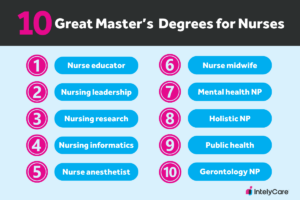10 Great Master’s Degrees for Nurses

Congratulations — the decision to pursue a Master of Science in Nursing (MSN) degree is an accomplishment in itself. You’ve succeeded in the rigors of nursing school and the field, yet you want to keep learning. Perhaps you’re only just starting nursing school, but you’re confident you’ll persevere long enough to get there. Either way, the abundance of choice in master’s degrees for nurses can help you find the right fit for your career.
On the other hand, parsing through all the options can be overwhelming. Before sharing a list of the best MSN degrees for nurses, let’s briefly explore some reasons why pursuing one of the many master’s degrees for nurses is worthwhile.
Increased Focus on Passion and Autonomy
If your heart is set on a specialty, obtaining your MSN enables you to focus on what sparks your passion, which can make your work more meaningful. A master’s degree also widens your scope of practice, which allows you increased autonomy as a nurse.
Higher Wages and Huge Need
MSN-prepared nurses are well compensated for their extensive training and responsibilities. Plenty of these nursing specialties offer six-figure salaries. The employment outlook for people who obtain one of the many master’s degrees for nurses is projected to grow much faster than most other occupations.
The Best MSNs for Nurses
There are so many directions your career can take with a nursing degree. If you’re in the market for an MSN, check out these top 10 master’s degree options for nurses.
1. Nurse Educator
In a time where there’s high demand for nurses, there’s unfortunately a lack of nurse educators. That means a great deal of students are turned away from nursing programs. Therefore, filling nurse educator jobs is critical to the future of healthcare. Learn more about how to become a nurse educator.
2. Nursing Leadership
Nursing leadership specializes in the business and logistical sides of healthcare. This route is for those aiming to be nurse managers, administrators, directors, clinical nurse specialists, or even chief nursing officers. This role extends beyond places specializing in direct patient care. This specialty is impactful wherever a nursing perspective is required for quality improvement, budgeting, and adhering to regulatory standards.
3. Nursing Research
Research ensures that nursing adapts to the needs of nurses and their place in healthcare. Nurse researchers provide data on safe staff-to-patient ratios, technology, best practices, reasons for burnout, and anything else to do with the profession. This specialty drives the ability of facilities to make informed decisions regarding nurses and patients. This is one of the master’s degrees for nurses that impacts the entire industry. Learn more about how to become a research nurse.
4. Nursing Informatics
This specialty is where technology and nursing unite. These nurses are heavily involved with the creation and improvement of electronic medical records. They also analyze data to improve patient care and the quality of work for healthcare professionals. Only nurses with their masters can reach senior positions in this specialty. As the importance of technology continues to grow in healthcare, so will the impact of nurses with their masters in informatics. Learn more about nurse informaticists.
5. Nurse Anesthetist
If you want to learn how to administer anesthesia and monitor patients in the operating room without attending medical school, this specialty is for you. There’s a lot of overlap between a nurse anesthetist and anesthesiologist, which is partly why this is the highest-paid of all the master’s degrees for nurses. For more information, read about how to become a nurse anesthetist and what you’ll need to do to get into CRNA school.
6. Nurse Midwife
Nurse midwives specialize in women’s reproductive health, and they also take responsibility for low-risk women during the birthing process. There’s a lot of overlap between the job of nurse midwives and the job of OB/GYNs, but one significant difference is that nurse midwives incorporate more holistic approaches. They work with patients to minimize invasive procedures and the use of medicine. Unlike OB/GYNs, they do not perform C-sections or any other intervention requiring an operating room. Learn more about how to become a nurse midwife.
7. Mental Health Nurse Practitioner
The demand for mental health services has been soaring since the COVID-19 pandemic. Facilities are increasingly dependent on mental health nurse practitioners to meet this need. They are especially important in rural areas where access is particularly limited. Learn more about how to become a psychiatric nurse practitioner.
8. Holistic Nurse Practitioner
Although it may not be top of mind for most people deciding between master’s degrees for nurses, this is a great option for those interested in a holistic approach where they can incorporate healing modalities outside of conventional medicine. There has been a heightened interest in approaches to healthcare that address how the mind, body, and spirit are interconnected. Holistic nurse practitioners are equipped with unique health knowledge to tend to the specific needs of their patients. Learn more about holistic nursing.
9. Public Health
Public health nurses address the collective issues of entire communities. They ensure their patients stay informed and provide access to preventative measures. Nurses with their master’s in public health can play an even greater role by becoming directors of health departments, community health programs, and more. These nurses have a profound impact on a multitude of lives. Learn more about the role of public health nurses and learn how to become a public health nurse.
10. Gerontology Nurse Practitioner
The aging population is increasing, and this trend will continue for the foreseeable future. That includes healthcare professionals entering retirement. The elderly consume the most healthcare costs and resources, yet the number of people qualified to care for them is decreasing. There is a gaping need for nurse practitioners in this specialty. Learn more about becoming an adult gerontology nurse practitioner.
Start Advancing Your Career
Are you ready to pursue one of these master’s degrees for nurses? You can offset the cost by finding an employer that offers tuition reimbursement and paths for career advancement. Learn how IntelyCare can match you with the nursing jobs that fit your needs.





